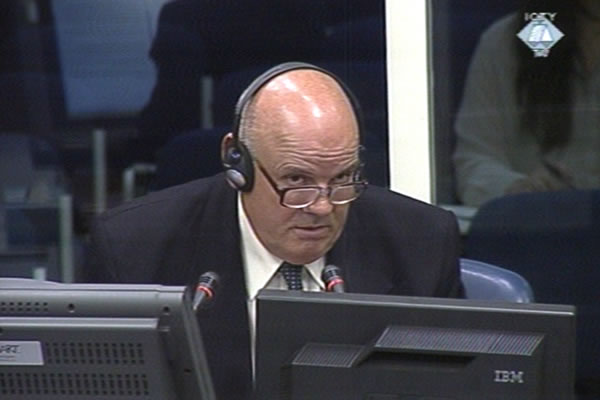Home
WHEN DID ‘WHISPERS’ ABOUT CRIMES IN ZVORNIK REACH KARADZIC?
Former chief of the Zvornik police Marinko Vasilic contends that everyone in the town was afraid of the paramilitary units. People ‘whispered’ about their crimes. As a result, he did not learn about them until later, and the delay before the reports reached Karadzic was even longer. The prosecution contested the claim, arguing that everybody knew everything but they did nothing to protect the Muslims in Zvornik
 Marinko Vasilic, defence witness of Radovan Karadzic
Marinko Vasilic, defence witness of Radovan Karadzic Radovan Karadzic shifted the blame for the brutal crimes against Muslims in Zvornik on the paramilitary units, exonerating the local police and municipal authorities, and by extension himself. Both in his statement to the defense and in his evidence today, former chief of the Zvornik police Marinko Vasilic tried hard to corroborate the defense case.
In the statement, the witness said that in the spring of 1992 the Muslim illegal units seized power in the town. The units were driven out by an attack launched by the JNA and other Serb formations, only for the town to be taken over by the paramilitary units from Serbia and Republika Srpska. The police first didn’t know about the crimes, Vasilic explained. When they learned about it, the police did not dare to respond because they were afraid the paramilitaries would target them. According to Vasilic, the fact that Zvornik was ‘cut off from the rest of the world’ and from Pale also was an additional problem. It was impossible to reach the leadership headed by Karadzic, and to complain about the paramilitaries running riot in the town. The situation was finally dealt with when Vasilic and the president of the Zvornik Crisis Staff Branko Grujic went to Pale in July 1992. Vasilic and Grujic informed Karadzic about the problems. Karadzic was ‘very surprised’ to hear about them and he dispatched the special police to deal with the situation.
The prosecution didn’t accept this scenario. Prosecutor Gustafson reminded the witness that in his interview with the OTP investigators in 2002 and in his evidence in Belgrade at the trial of Branko Grujic, he said something completely different. As she elucidated, Vasilic’s previous claims indicate that the police knew about the abuse and killings of Muslims in several prison facilities such as the Culture Hall in Celopek and Drinjaca, Gerina Klanica and others. The witness said some police officers may have known about that, but he, as the police chief, did not. ‘People were whispering about it’ because ‘no one dared to speak out loud’ about the crimes, Vasilic explained. The ‘whispers’ first reached him after a couple of months. When the prosecutor put it to him that the crimes were not investigated, Vasilic agreed, adding that the police officers were scared too.
The prosecutor contested Vasilic’s claim that the information about the crimes in Zvornik did not reach the leadership in Pale before July 1992. First, the prosecutor showed a report the Bosnian Serb MUP inspectors wrote on their visit to Zvornik from 29 May to 12 June 1992. The report notes that the local police had ‘numerous problems’ with the paramilitary groups and that the army was protecting ‘persons prone to crime’ who were congregating in Captain Dragan Vasiljkovic’s training camp in the village of Divic. Also, the prosecutor presented an entry from Ratko Mladic’s diary about a meeting between Karadzic and Mladic and the Zvornik municipal leaders on 30 June 1995. Karadzic’s words, which Mladic wrote down, indicate that Karadzic knew about the crime kingpins in Zvornik, whose nicknames were Zuca and Crni. Interestingly enough, the witness reported at the meeting that the security situation in the town was ‘satisfactory’. Vasilic replied that he ‘could never have uttered such a phrase’.
Karadzic’s trial continues after a long weekend on Wednesday, 19 June 2013.
Linked Reports
- Case : Karadzic
- 2013-06-12 AMBASSADOR DENIES GENOCIDE AND MOCKS VICTIMS
- 2013-06-11 KARADZIC’S WITNESSES BLAME MLADIC’S ‘MILITARY CLIQUE’
- 2013-06-10 FRENCH AND SERB NATIONALISTS DEFEND KARADZIC
- 2013-06-19 KARADZIC’S WITNESS: ‘MORE THAN 50 PERCENT OF SREBRENICA IS FRAUD’
- 2013-06-20 HOW KARADZIC WAS TRICKED
- 2013-06-20 KARADZIC THREATENS LAGUMDZIJA WITH SEVEN YEARS IN PRISON
